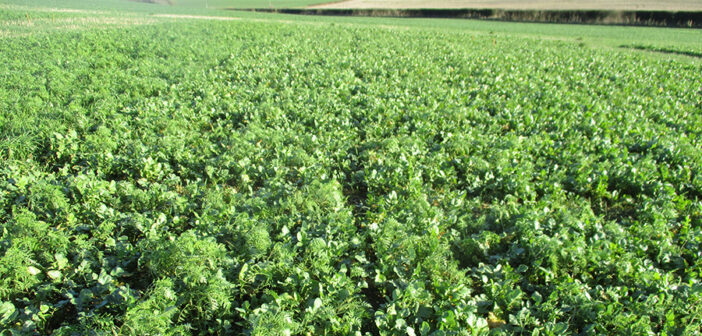Nitrate leaching can be reduced by up to 90% by using cover crops, a study has found, helping add benefits to future yields.
A project by the Nitrogen release from Cover Crops (NiCCs) project, funded by Affinity Water and Portsmouth Water and delivered by ADAS, aimed to identify which cover crop species and methods of destruction were the most beneficial for the release of nitrogen for future yields.
See also: Agriculture input costs likely to remain high in 2024, AHDB warns
Two cover mixes were used over two cropping seasons on farms in Hertfordshire and West Sussex.
The first consisting of 80% Oil Radish and 20% Phacelia at 15 kg/ha. The second used 45% Japanese oats, 45% Buckwheat and 10% Phacelia at 10 kg/ha. Both were compared to a weedy stubble control.
Cover crops were then destroyed by either mechanically rolling on a frost, chopping and incorporating, or through the use of chemicals.
The results indicated that cover crops can reduce nitrate leaching losses by up to 90% against to control mix. In-soil nitrogen was also seen to increase by up to 35 kg N/ha in the next spring cereal crop, dependent on the species mix and the establishment of the cover crops.
Yields after a cover crop was used also increased by 0.2-1.0 t/ha against those with the control, and when destroyed, the cover crops released significantly more N.
Chemicals were the most beneficial method of destruction, increasing N mineral release, grain N offtake, and total crop N uptake more so than mechanical methods, leading to improved yield quality.
Principle soil scientist for ADAS Dr Anne Bhogal also commented that the benefits of cover crops cal also protect surface and ground waters.

Simon Deacon © ADAS
Simon Deacon, catchment and environment manager for Portsmouth Water spoke on how the company will use the results going forwards.
“Cover crops have been proven to reduce nitrate leaching in to groundwater by up to 90% and therefore help toward improving water quality and supply of drinking water,” he said.
The study also acknowledged that it was actually more cost-efficient to destroy weeds chemically unless financial incentives were used. It concluded that schemes should support cover crop use to help improvements like water quality, soil health and biodiversity.
Results and recommendations can be found in full here.




